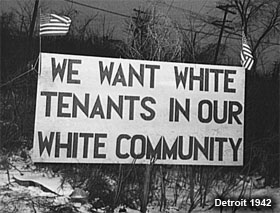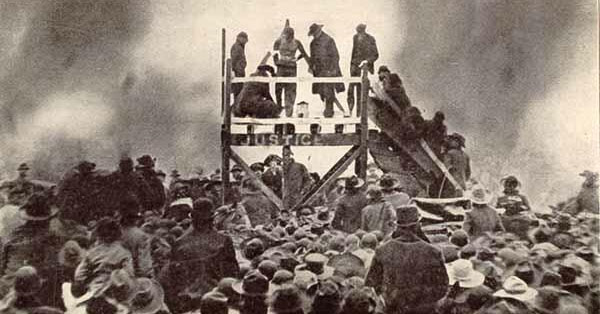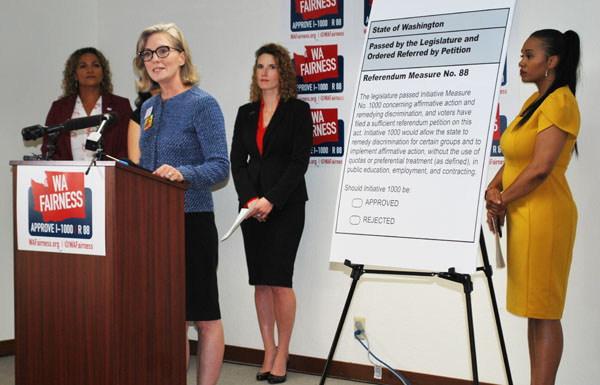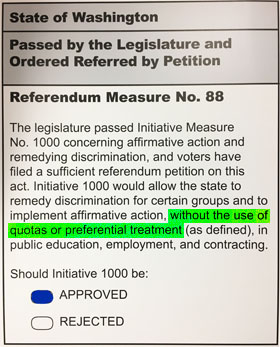OPINION
I-1000 opponents seek to misinform, divide
Comparing affirmative action to Jim Crow laws is wrong, deeply offensive
By APRIL SIMS
(Oct. 25, 2019) — Recently, one of the leaders of an Asian American group opposing approval of Initiative 1000 described the ballot measure — which would reinstate affirmative action in Washington state — as akin to Jim Crow laws.
 On its face this is a ludicrous and false claim. But while this is easily debunked, it’s saddening to see one marginalized group attempting to marginalize others. Further, this sickening use of one of the most disgusting forms of codified racism in this country’s history calls for a robust response.
On its face this is a ludicrous and false claim. But while this is easily debunked, it’s saddening to see one marginalized group attempting to marginalize others. Further, this sickening use of one of the most disgusting forms of codified racism in this country’s history calls for a robust response.
Here’s what Jim Crow laws really were. Black people were barred from eating, drinking, sitting, working, getting an education, or living with white people. Black people were denied the right to vote, own property, or run for office. Lynch mobs of white men and women murdered Black people with impunity. Police officers regularly beat and killed Black people with no consequences, while overwhelming numbers of Black men were locked up in prisons built on plantations and forced to work back-breaking jobs for long hours with no pay.
For me, my family, and millions of other Black Americans, Jim Crow laws are not some abstraction to be invoked for personal gain. Our families were directly targeted by these laws, and the impacts of this anti-Black, state-sponsored racial discrimination are still felt in our families and communities today.

Discussing Jim Crow laws is deeply personal for me. My grandfather took the family out of Louisiana to escape the shackles that Jim Crow laws placed on his family and their dreams. He was a sharecropper, and when he realized that buyers were underpaying Black farmers, he challenged that inequity. So the white folks in that town pulled together a lynch mob to put him in his place. He and the family escaped that town with their lives but little else, and made their way to northern Louisiana to my grandmother’s family. Her family said they could stay, but on one condition; my grandfather had to keep his head down, had to stop fighting for fair treatment, for dignity and respect. He couldn’t abide by those conditions, and my family left Louisiana for Washington.
That’s what Jim Crow laws were intended to do; to beat down the soul of Black folks, to instill fear, and to try to make fighting for your rights a death sentence.
Comparing Jim Crow laws to I-1000 is an effort to sow confusion about what the initiative would do, but it’s also an attempt to diminish the real impact of Jim Crow laws. Comparing Jim Crow laws to the modest affirmative action outlined in I-1000 seeks to minimize the impact of Jim Crow; if Jim Crow — and the codified racism that could be found across the nation prior to the civil rights movement — wasn’t that big a deal, than why would we even need a policy like I-1000 in the first place?

(From left) April Sims, Kristin Rowe-Finkbeiner, Danielle Hall, and Washington Fairness Communications Director KD Hall at the Sept 12 press conference.
But years of data tells the truth. White households in Seattle have a median income of $105,000; Black households have a median income of less than $45,000. Since the passage of I-200 in 1998 banning affirmative action in Washington, there has been a steady decline in the number of state contracts awarded to people of color. People of color, especially Black folks, are over-represented in our state’s prison population, and underrepresented in public universities.

I-1000 offers modest measures to increase access and opportunity for historically underrepresented people, including women, veterans, older folks, and people of color. It allows outreach and recruitment of qualified candidates among these populations, but specifically bans the use of quotas and preferential treatment.
We have a long history of laws based on racial exclusion in this country. With I-1000, we have an opportunity to vote for more inclusion in Washington state.
Please join me in saying YES to equality and opportunity for all Washingtonians by voting to approve I-1000 via Ref. 88 on your ballot by Nov. 5.
April Sims is Secretary Treasurer of the Washington State Labor Council, AFL-CIO, representing the interests of more than 600 union organizations with approximately 550,000 rank-and-file members. She is also Co-Chair of the Washington Fairness Campaign to Approve I-1000/R88. This column first appeared at The Seattle Medium and is posted here with the author’s permission.





